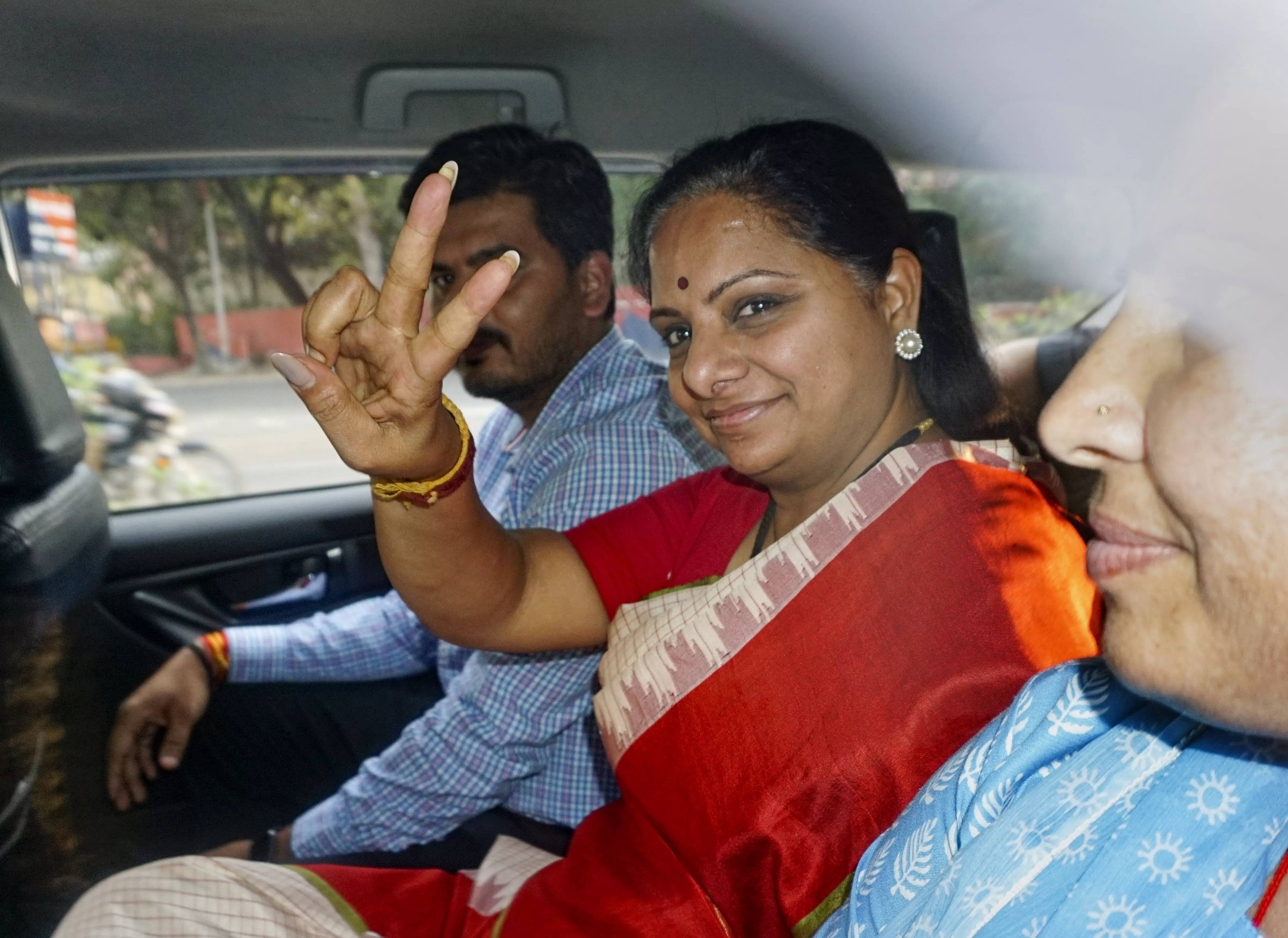
Explained: BRS leader Kavitha’s exact 'role' in Delhi excise policy case
Kavitha and a partner allegedly held stakes in a liquor company through proxies, which they allegedly used to exert control over the Delhi liquor business

The arrest of Bharat Rashtra Samithi (BRS) leader and MLC Kavitha by the Enforcement Directorate (ED) for alleged involvement in the Delhi liquor scam shows selective scrutiny by the investigating agencies.
Kavitha, daughter of K Chandrashekar Rao, the former chief minister of Telangana, was arrested on Friday (March 15) after a series of investigations and searches at her residence in Hyderabad.
Liquor scam
The controversy surrounds allegations that kickbacks were paid to Aam Aadmi Party (AAP) leaders to manipulate the liquor business in Delhi. Hyderabad-based businessman Arun Ramachandran Pillai, arrested earlier, allegedly confirmed Kavitha's involvement.
The ED has also accused Kavitha and a partner of holding a significant stake in liquor company Indo Spirits through proxies. This stake was allegedly used to exert control over the liquor business in Delhi, with chargesheets filed against her detailing kickbacks paid to facilitate this control.
Kavitha’s role
These documents indicate that Kavitha was involved in financial transactions related to the scam, including purchasing land parcels in and around Hyderabad with the proceeds from these illicit activities.
Further complicating matters, a supplementary chargesheet by the ED alleges that Kavitha and her husband engaged in financial transactions with Phoenix Group of companies, which were linked to the acquisition of costly land parcels in Hyderabad using profits from the scam.
Land deals
It is claimed that these lands were bought at significantly lower prices due to Kavitha's political influence, indicating a broader scheme of money laundering and illicit profit.
In December, the CBI summoned Kavitha as a witness in a case on the assumption that she might know the details and context of the investigation. Even though she was asked to testify, she faced inquiries regarding her alleged connections with various individuals who had been detained, including P Sarath Chandra Reddy from Aurobindo Pharma, and Amit Arora, a businessman based in Gurugram.
South Group
The ED had earlier mentioned Kavitha's involvement on behalf of a group known as the "South Group" in allegedly bribing officials and ministers of the AAP government in Delhi. During her interrogation by the CBI, she was also asked why she had changed her mobile phone multiple times recently.
The ED's desire to question Kavitha was initiated by the detention of Arun Ramachandran Pillai, a businessman from Hyderabad. The intention was to have Kavitha confront Pillai, who is believed to be a representative for the South Group and said to be implicated in influencing the excise policy's phrasing.
Kavitha’s representative?
The ED accused Arun Ramachandra Pillai of routing bribes worth Rs 100 crore to functionaries of the AAP. As a crucial figure and alleged representative of Kavitha, Pillai is said to have carried out her instructions and was allegedly key in orchestrating a cartel that controlled a significant share of the wholesale liquor market in Delhi, according to the ED.
The ED's allegations extend to Pillai's involvement in the policy's formulation, where he is said to have provided input and participated in discussions that proposed advantages in the policy to benefit the cartel. Moreover, Pillai was implicated in a broader conspiracy involving kickbacks to the AAP from the South Group, as per the ED's claims.
CA’s arrest
In a related development, the CBI arrested Hyderabad-based chartered accountant Butchibabu Gorantla for his alleged involvement in formulating and implementing the now-discarded Delhi excise policy, believed to be a close associate of Kavitha.
Despite his arrest, Butchibabu was later granted bail, with the court noting his lack of direct involvement with certain financial transactions scrutinised in the investigation.
Excise scandal
The Delhi liquor scam is a sprawling investigation involving alleged corruption and manipulation of the liquor distribution policy by the Delhi government in 2021-22, aimed at benefiting certain dealers through cartelisation and kickbacks. This scandal has roped in various individuals and entities, leading to widespread scrutiny and legal action by both the Central Bureau of Investigation (CBI) and the ED.
The liquor scam, also known as the Delhi excise policy scandal, revolves around allegations of corruption and procedural lapses in formulating and implementing the Delhi excise policy for 2021-22. This policy marked a significant shift from government-controlled liquor sales to opening the market to private entities through bidding.
Government’s aims
The government aimed to increase revenue, curb the liquor mafia's influence, and improve consumer experience by allowing discounts on liquor, home delivery, and extended sales hours until 3 am. The city was divided into 32 zones, each permitted to have up to 27 liquor vends operated by private vendors.
Controversy arose when allegations surfaced that the AAP government extended undue financial favours to the liquor licensees after the tenders were awarded, causing significant losses to the state exchequer. The policy was accused of facilitating kickbacks and commissions in return for these favours, with claims that these illicit gains were used to fund AAP's election campaign in Goa.
Major lapses
Amid rising scrutiny, a report by Delhi's chief secretary highlighted serious procedural and financial irregularities, leading the Lt Governor to recommend a CBI investigation into the policy. This eventually resulted in the policy being rolled back, reverting to the older system where only government-run shops could sell liquor.
Manish Sisodia, the then deputy chief minister of Delhi who also held the excise portfolio, was arrested by the CBI in connection with these allegations. His arrest in February 2023 related to allegations of corruption in formulating and implementing the excise policy for 2021-22, which he oversaw as the minister.
